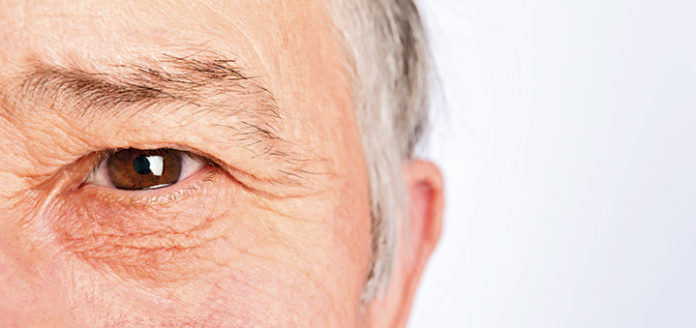By Marguerite Thomas and Dr. Susan Leat
Anyone can have vision difficulties, but not everyone can plainly state their problems or seek effective help. As a caregiver, you may be responsible for a loved one who has vision issues, but who cannot clearly tell you. Their slips, trips or falls could be dismissed as being due to clumsiness or minor coordination problems. However, it could be due to poor vision. How can you tell? Watch for a loved one having difficulty recognizing a face across the room, difficulty reading the newspaper or watching television, or not noticing objects in their side vision, tripping over objects or hesitating at steps or changes in the flooring.
At age 65 and older, all adults should have an annual eye exam. Many common eye conditions do not have external signs. Glaucoma damage is irreversible, so early detection is paramount. Macular degeneration and cataracts show no signs to the casual observer. Regular exams, conducted by a Doctor of Optometry, mean that health and vision issues are being detected and treated early.
There are several aspects of vision related to falls. Visual acuity is the ability to see small objects that are black and white, while contrast sensitivity shows how a person can see larger objects that are shades of grey. Older adults can experience decreased visual fields which will decrease their side vision. Depth perception may become poorer, resulting in not seeing the depth of a step and taking a misstep. Deficiency in all these aspects of vision is related to falls. Another factor related to falling is visual attention or the ability to process and respond to two things at once which may affect walking safely around objects.
Other risk factors can include multifocals/bifocals spectacles (including no line bifocals) and large changes in the prescription of glasses. Sometimes a new prescription will cause the world to appear tilted, or objects may appear further away or closer than they actually are. Older people may take longer to adapt to prescription changes and should be especially careful to gradually get accustomed to new glasses.
Environmental improvements include:
– having good lighting, but not glare (e.g. from shiny surfaces or lights without shades)
– using night lights, but turning on the lights when getting up at night is even better
– keeping eyeglasses clean and in good repair
– reducing clutter and busy patterns
– providing contrasting color strips or a painted line at the edge of stairs or any floor level change
– avoiding abrupt changes in flooring, as people with dementia may think there is a step or hole
Finally, as we age, we are more prone to dry eye disease, which is inadequate lubrication from tears. Treatment generally starts with artificial tear eye drops, but a professional consultation should be sought if you notice:
- red or painful eyes.
- flaking, discharge, or a sore on the eye or eyelid.
- an injury to the eye
- a bulging eye or a drooping eyelid.
- joint pain, swelling, or stiffness and a dry mouth along with dry eye symptoms.
- no improvement within a few days despite using the tear drops
Prevention or symptom relief include:
- not smoking and avoiding second-hand smoke, direct wind, and air conditioning.
- using a humidifier, especially in the winter
- limiting allergy and cold medicines that are drying and may worsen symptoms.
- purposefully blinking more often. Resting the eyes once in a while.
- cleaning eyelashes regularly and applying warm compresses
- other more specific interventions can be recommended by your optometrists or ophthalmologist.
For further information, check out the Eye Health Library of the Ontario Association of Optometry https://tinyurl.com/Eye-Health-Library. The website provides links for you to learn more about the role of Doctors of Optometry. Check out What is the difference: Doctors of Optometry, ophthalmologist and opticians; Eye Care for Older Adults; and Risks Associated with Sun Exposure. For more detailed vision/fall prevention information, go to www.youtube.com/SHKNetwork and scroll down to view the archived webinars by Dr. Susan Leat, Professor and clinician in the Paediatric and Special Needs Clinic and Low Vision Clinic, University of Waterloo School of Optometry and Vision Science. The webinars are shared courtesy of the Fall Prevention Community of Practice www.fallsloop.com.
Marguerite Oberle Thomas, Coordinator, Fall Prevention Community of Practice and Dr. Susan Leat, Professor, School of Optometry and Vision Science, University of Waterloo


